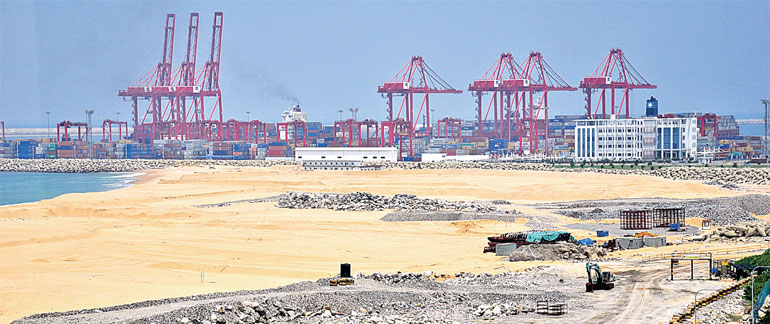Tuesday Feb 17, 2026
Tuesday Feb 17, 2026
Tuesday, 12 April 2016 00:01 - - {{hitsCtrl.values.hits}}
Sri Lanka is on the cusp of something. Not just #avurudu, which is *aluth* every new year... when the sun transits from the House of Mina (Pisces) to the House of Mesha (Aries), metaphorically showing a new face to a world it supposedly rules. But literally in the sphere of civics and governance and our worldly rulers also...
The problem is – unlike the metaphysical transit of >Sol, which is astronomically predictable and astrologically predicated – the advent of >Good>Gov is far more mercurial than solar. And while (ironically enough in a nation where most things run behind time all the time) folks will note the passing of the old and the arrival of the new ^aluth avurudda^ – on the dot, punctiliously – the transition of government from its spring to its summer cannot be similarly marked with any degree of accuracy.
With good cause, perhaps, or reason or justification. Many have pleaded the incumbent administration’s case in sundry forums from seminars to newspaper columns. Even though these raisons d’etres of those passionate apologists is transparent enough for anyone with eyes to see, their rationale must give any decent citizen (keen to give their government – and thereby themselves – a fair chance or hearing) space for pause.
Some of the more sterling defences are summarised below (~Conventional Wisdom). Then comes a critique of each of these positions (~Devil’s Advocate).
 THE OLD ORDER CHANGETH, yielding place to new: but – like the king’s slow answer from his barge of death, challenges to transformation have raised their heads. The more some things change, the more they may seem to remain the same... but change is inevitable – and for the better or worse will depend on government’s intentions as much as ability, as well as the polity’s integrity and willingness to partner Good Governance in a slow, laborious, tedious process
THE OLD ORDER CHANGETH, yielding place to new: but – like the king’s slow answer from his barge of death, challenges to transformation have raised their heads. The more some things change, the more they may seem to remain the same... but change is inevitable – and for the better or worse will depend on government’s intentions as much as ability, as well as the polity’s integrity and willingness to partner Good Governance in a slow, laborious, tedious process
Conventional Wisdom > Apologetic Rationale #1:
We have emerged from an era of “the darkness of impunity, profligacy, and loot”. It is a “new dawn of hope and expectation that we could function yet again, at least, as a formal democracy – albeit flawed”. The people must remember – and be grateful – that we no longer languish under a “populist majoritarian autocracy [that] the previous regime had cowed most of us into”.
Devil’s Advocate > Critical Response #1:
An oppressive burden pressed upon us by antidemocratic forces grown bold by citizen and civil societal apathy has been lifted – of that there is little if any doubt. But it has been fifteen months – and counting – since that heady dawn (when ‘bliss it was to be alive, to be young was very heaven’). There is some allowance for common or garden folks to compare apples with papols in the first flush of a revolutionary upheaval. That the trend persists over a year later – and in the face of several factors (some of these the same as those militating against the former regime) – carries little merit, and no small measure of naïveté at best or ignorance of Good Governance’s true paradigms at worst. So the apologist himself is more than authentic in admitting that “the mist has yet to clear” – or maybe a tad trite or idealistic in further asserting: “clear it must... to reveal the broad sunlit uplands of the promised and expected governance, reconciliation, and unity”. There are many promises to keep and miles to go before we sleep (that is, for government to rest on its laurels and for all fair citizens and true – and not only Colombo’s cafe society and the rest of Sri Lanka’s liberals island-wide – to get a good night’s sleep).
Conventional Wisdom B: Apologetic Rationale #2:
The government (arguably, despite all its successes to date: e.g. 19A, RTI bill, etc.) is suffering from an acute case of ‘bad press’. This is not only unfair and unfortunate, but “far, far, too early in the day”. There is a lot of time in this  coalition government’s life left, and plenty of wiggle-room evident, for this administration to deliver and maybe even exceed its promises to a would-be delighted populace. Things are not as bad as they seem.
coalition government’s life left, and plenty of wiggle-room evident, for this administration to deliver and maybe even exceed its promises to a would-be delighted populace. Things are not as bad as they seem.
Devil’s Advocate B > Critical Response #2:
The government (demonstrably, because of all its shortcomings to date: e.g. a jumbo cabinet; being in bed – and cabinet – with some bad guys – leftover from the previous regime – for the sake of parliamentary clout; etc.) is suffering from an ironic instance of ‘poetic justice’. This is not only free and fair, but it is to be expected ‘under the rule of men entirely great’ (all right, I exaggerate a little!) where ‘the pen is mightier than the sword’. A lot of time given to this coalition government has been lost – wasted – exploded lambasting and excoriating the faults of the former regime. Things in some quarters are worse than before, and it’s not only in habitual coalition governments’ woe of being lamentably bad at “singing from the same hymn sheet”.
Conventional Wisdom C: Apologetic Rationale #3:
The government has its back to the wall at the moment. And it is the duty of a responsible citizenry to put its shoulder to the wheel to alleviate (in some way, at least) present concerns (perhaps by easing off the pedal of critical engagement qua critical engagement). One defender of the democratic faith on this tack has invoked the incumbents being “in the throes of constitutional reform, transitional justice, and an IMF standby agreement”. To these, maybe, we’d add the shadowy spectre of a seemingly renascent fear of terrorism (if not covert activity itself); a stricken balance of payments situation and pressure on foreign currency reserves; and public protests against some of government’s capstone development projects.
Devil’s Advocate C > Critical Response #3:
Government – if it cannot get its act together, as it seems it can’t “cope” with or “coordinate” without a “cohesive” policy statement or stance – has no one to blame but itself. Critical engagement by the public in general and civil society in particular is, therefore, the need of the hour; not anathema (even if it is wormwood in the mouth of wounded mandarins of state). Howbeit the citizenry themselves are at the mercy of the slings and arrows of outrageous fortune in the guise of a call to austerity on the one hand and a commission to eat bread if they have no cake on the other? Quel dommage and bitter gall if the masses are enjoined not to cry out against their governors – good, bad, or ugly!
Yes, as you will recognise from C/#3 above, some of the responsorial criticisms are as weak and indefensible as some of the apologetic pleas farther above: A/#1. Thus, there is nothing either good or bad, though thinking makes it so. We, simply, have striven to show – by random and limited sampling of attack and defence – that there is much to be said on both ‘sides’. I would argue that there are no ‘sides’ as has been traditionally understood in terms of Party A or Faction B or Coalition C; merely the case for and against a cobbled together group of incumbents rallying at the barricades under the banner of Good Governance.
No doubt, much can be said in defence of the government’s brief assay at this... No doubt, much more has been essayed to critique it. It is a small price for government to pay for the prize it won for its critics and supporters alike – that of freedom of expression, critical or supportive or neutral (as we have striven to be).
Some of the defences include:
The bottom line is that as much as it takes of a polity to strike a social contract with a government has struck a new deal sometime ago, and had better be patient with government’s alleged or perceived “treasons, spoils, and stratagems” now. In the growing light of the vaunted dawn that romantics and idealists pen in their halcyon columns after a hiatus, these may turn out to be no more than ‘small betrayals’, ‘petty plunder’, and ‘the usual politicking’ or ‘realpolitik’ that is par for the course in the art of the possible. And these delays, excuses, or rationalisations, pale in comparison. They are verily a velvet glove in comparison to the iron fist that had us in its grip not time out of mind yet.
In the long run, we are all dead – and that’s just life, not only economics. In the limit, although ‘it takes time to do things immediately’, we’d urge Good Governance to move its actions and communications process into a new phase: “A clear and coherent message of what is being done and why” (per one apologist), as well as what could and should be done and what would take time to do and what will not be done and why. In the spirit of #avurudu’s *new face* we’d enjoin readers to show some grace, hastening slowly, coming to our senses about how little it can get worse, before it can – and must – get better.